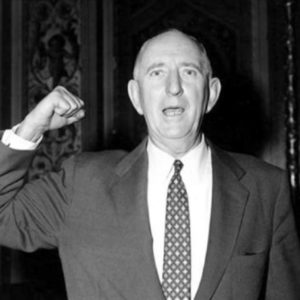Editor’s Note: For an alternative viewpoint, please see: Counterpoint: In Renaming Senate Building, Is Any Candidate Perfect?
Removing the name of former segregationist Richard B. Russell from the office building of our nation’s most powerful body of elected officials is not a partisan issue. It’s an American issue. It is important that more individuals learn the true history of our nation — a history that includes not only the birthing of the ideals to form a true democracy but also the ideals that were used to justify the cruel and barbaric institutions of slavery and segregation.
Richard B. Russell’s bitter fight against black progress and civil rights is legendary. He not only teamed with staunch racist and segregationist Strom Thurmond to author the Southern Manifesto; he fought tooth and nail against the passage of the 1964 Civil Rights Act and then organized a boycott of the 1964 Democratic National Conference to protest President Lyndon B. Johnson signing the bill into law.
Russell was not a run-of-the-mill politician. He was a figurehead who championed white supremacy and segregation. He stood proudly on the wrong side of civil rights, helping segregationists frame the opposition to civil rights under the guise of “state rights.”
Removing his name is not a partisan issue. It is simply the right thing to do.
He, like so many other vestiges of America’s racist epoch, is not merely resilient artifact of a time long gone; he is a source of inspiration for those who still tout white supremacy despite the fact that Brown v. Board of Education ostensibly ended legal segregation more than half a century ago. These symbols give oxygen to the fires of hate feeding an idea of humanity as a value-based proposition grounded in the color of one’s skin and not their character. It is an inherently antithetical proposition to “the home of the free and home of the brave.”
In his “The Three Evils of Society” speech a year before he was murdered, the Rev. Dr. Martin Luther King Jr. called America a “schizophrenic personality.”
“Ever since the birth of our nation, white America has had a schizophrenic personality on the question of race, she has been torn between selves. A self in which she proudly profess (sic) the great principle of democracy and a self in which she madly practices the antithesis of democracy. This tragic duality has produced a strange indecisiveness and ambivalence toward the Negro, causing America to take a step backwards simultaneously with every step forward on the question of Racial Justice; to be at once attracted to the Negro and repelled by him, to love and to hate him. There has never been a solid, unified and determined thrust to make justice a reality for Afro-Americans.”
Calling for the Senate to make this long-needed change is nothing new. The NAACP’s protest of racism has continued unabated since its formation in 1909. We’ve protested the signs and symbols of the Confederacy, the Ku Klux Klan, Nazis, and any other group who look upon the legalized oppression of black people and sees anything other than a horrific blood stain on the history of American democracy.
Today we continue this fight, whether it’s calling out the xenophobia emanating from the White House or standing up against laws and policies that allow for racism to exist obfuscated by a crafted veil of decency. Our 2,200 branches remain on the frontline of this fight as they push for the removal of public statues that celebrate patriarchs of oppression and seek to chisel off the names engraved upon buildings that serve to glorify America’s explicitly racist past.
For the descendants of Africans enslaved by this nation, the pain associated with seeing these symbols of our collective oppression is akin to living with a ghost that haunts your every waking moment. For some of us, the pain is simply the rude awakening that despite all that we have given to this nation, it always seems just one small step away from truly recognizing our humanity.
If we are to continue to push America toward a progressive future, one that removes the legitimacy of those who chose to embrace racism over democracy, we can only do so at the ballot box. By showing up in full force at the ballot, we make a choice about not only the type of politicians we want, but instead what type of nation we will choose to be.

